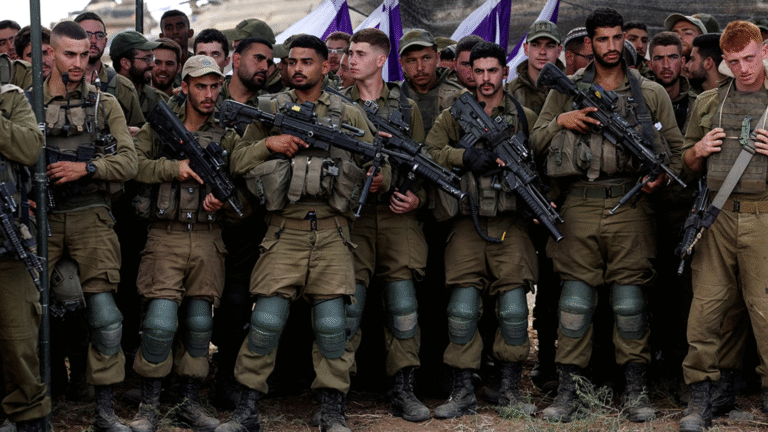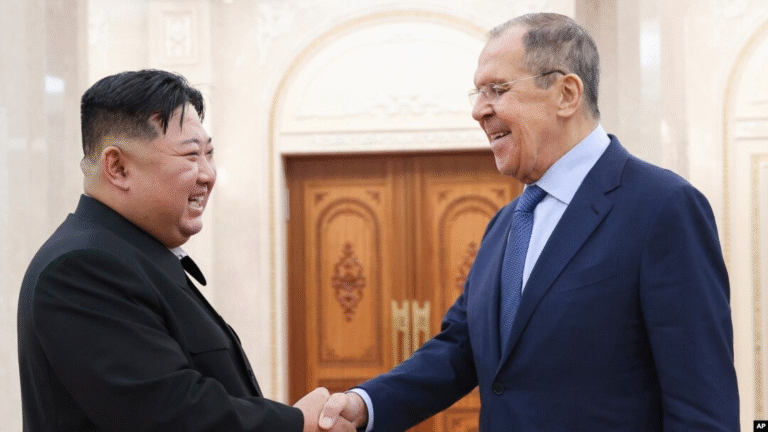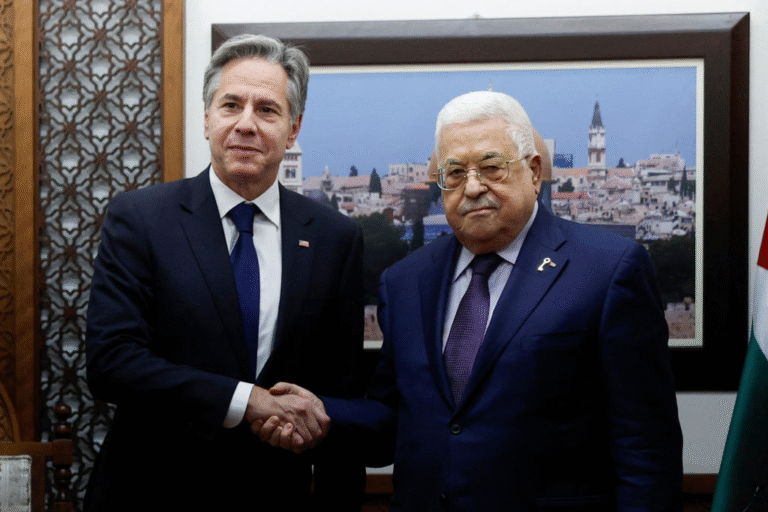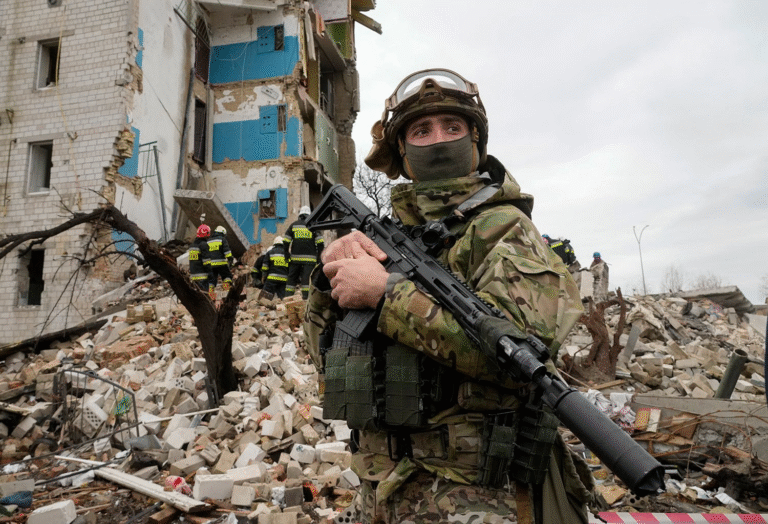
Israeli protests demanding the freeing of the Bibbas family.
Photo Credit: Ariel Schalit of the Associated Press
Nicholas Tocco
The America-Eurasia Center
The Middle East Program
www.EurasiaCenter.org
The America-Eurasia Business Coalition
www.usebc.org
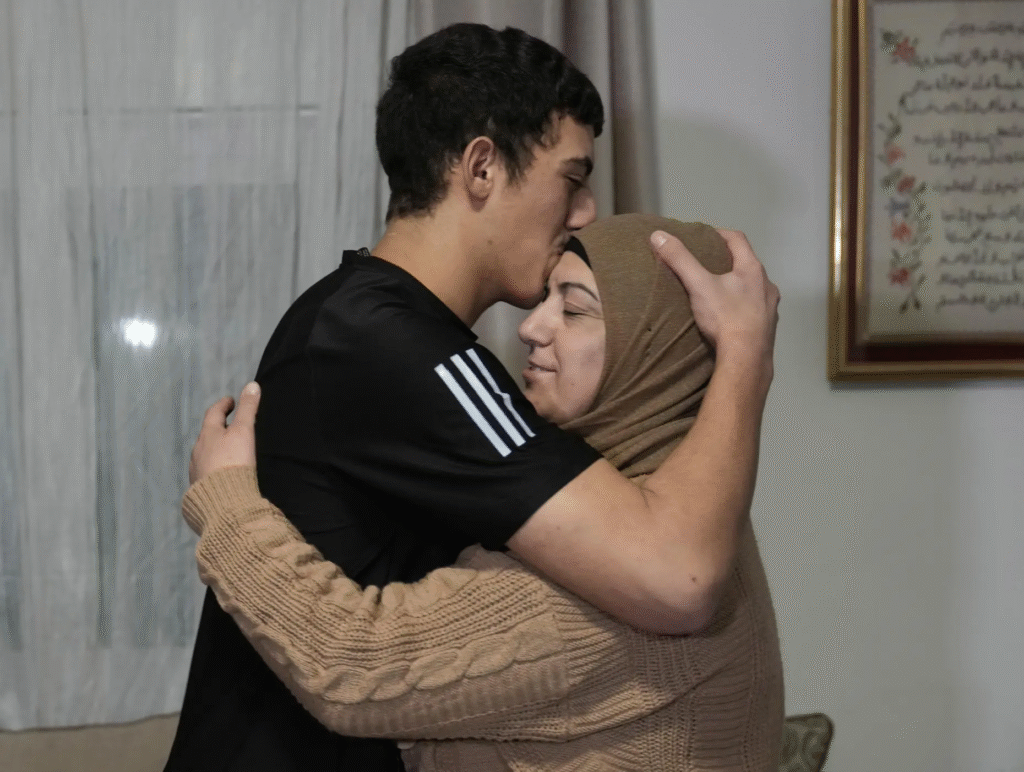
The reunion between the released Palestinian prisoner, 17-year-old Muhammad Abu Al-Humus, and his mother.
Photo Credit: AP Photo/Mahmoud Illean
The war between Israel and the Palestinian militant group Hamas has been raging for roughly
two months at the time of this article’s publication. Hamas’ attack on Israel on October 7th resulted
in the kidnapping of 240 people, ranging from the elderly to the very young.1 In addition, Hamas
killed over 1,200 people in the attack on October 7, 2023. For these actions, as well for many other
actions it has taken in the past, Hamas is considered a terrorist organization by the United States and
Israel.2 Fortunately, there was a brief respite for these hostages and Palestinian prisoners between
November 24th and December 1st, where an agreement between Israel and Hamas resulted in the
release of 105 Israelis and captives of other nationalities released in exchanged for 240 Palestinian
prisoners, many of whom were women and children and many that were not charged with any crime.3
Israel has now fully resumed its bombardment and invasion of Gaza, meaning that the death toll of
Palestinians will increase dramatically and the remaining hostages being held captive by Hamas are
still unlikely to be freed, making it all the more difficult for a peaceful resolution to be reached
between the two sides. Perhaps the testimonies of those held hostage by Hamas and the Palestinians
imprisoned by Israel will allow for a better understanding of those that suffered because of this
conflict and thereby allow for a better chance of peace.
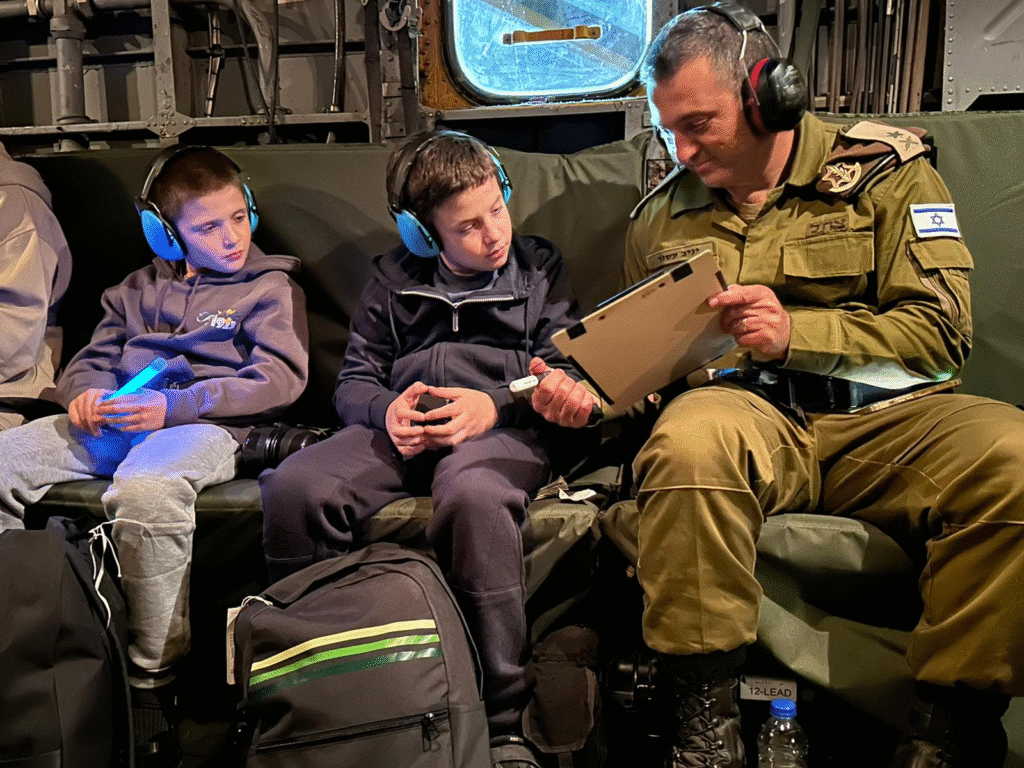
On the left is 9-year-old Tal Goldstein and on the right is his 11-year-old brother, Gal.
The two brothers were released by Hamas and flew back to Israel on November 27, 2023.
Photo Credit: The IDF through the use of the Associated Press.
In Qatar, a meeting was held between the CIA Director William Burns, the chief of Mossad
David Barnea, and the Qatari Prime Minister Mohammed bin Abdulrahman. This meeting was
crucial to brokering a ceasefire.4 Tense negotiations between Israel and Hamas, combined with the
aid of foreign nations such as Qatar, resulted in the agreement that for every hostage released by
Hamas, Israel would release three Palestinian prisoners. Several of the hostages that have been
released by Hamas are from the Nir Oz kibbutz, a community in Israel that has more than 25% of its
population marked as either dead or missing. The hostages freed ranged from the very old, such as
the 85-year-old Yafa Adar, who was released on November 24th, the founder of Nir Oz whose
abduction on a golf cart had gone viral, to the very young, such as the 9-year-old Emily Hand, who
was initially thought to be dead in the aftermath of the October 7th attacks, but was fortunately alive
and tearfully reunited with her father, Thomas Hand on November 25th. However, these reunions are
tinged with a bittersweet feeling as Adar’s grandson and father of two, the 38-year-old Tamir Adar,
is still held hostage by Hamas. Another example of this can be seen with Hila Rotem, the 13-year-old
who was released on November 25, but still awaits the release of her 54-year-old mother, Raaya
Rotem. Others, such as Emily Hand, have much psychological recovery to go through.5 It has only
been recently revealed about the full extent of the conditions the hostages were subject to, primarily
because the “Red Cross and other humanitarian groups have not been allowed to visit the hostages.”6
This appalling revelation may hopefully be remedied in the ongoing conflict, but given Hamas’ status
as a non-state actor, it is difficult to know how to best compel them to allow for the presence of
groups such as the Red Cross.
Hostages such as Adina Moshe were forced into tunnels and walked barefoot for hours before
being placed into a room that had limited hours of access to electricity. However, hostages like Emily
Hand were placed above ground in a series of houses, eventually being forced to move between them
as Israel’s invasion of Gaza began to intensify. As of December 1st, it is believed that “40-50% of
buildings in northern Gaza have been damaged, independent researchers say, and the United Nations’
Office for the Coordination of Humanitarian Affairs said on Wednesday up to 1.8 million people in
Gaza, or nearly 80% of the population, are thought to be internally displaced.”7 It would be wise for
Israel to conduct itself in a much more restrained manner so as to ensure the safety of both its own
hostages and innocent civilians in Gaza. However, it should also be important to note that one should
not rule out the possibility that Hamas kept hostages above ground knowing full well the implications
of what could happen to them. Perhaps its members thought that if confronted directly by an IDF
soldier, they could use the hostages as a human shield. The testimonies from the hostages make it
clear that Hamas had no moral qualms about inflicting pain, both physical and psychological, onto
them. Since returning home, Emily Hand only speaks in whispers, her father saying that she was
taught “keep quiet” in Arabic. Another child hostage, Eltan Yahalomi, was forced to watch disturbing
films of the October 7th attacks. “Omer Lubaton Granot, who founded the Hostages and Missing
Family Forums, said a gun was held to Eltan’s head to threaten him if he would cry.”8 Other children
that were held captive by Hamas describe how they had been told that all of their families were dead
or that they did not have a home to return to. In other words, innocent children that had committed
no wrong had been subject to psychological warfare.
In terms of access to food, the hostages were able to enjoy the same food as their guards in
the early days, eating chicken, rice, canned goods, and even being able to drink tea. However, with
the increasing pressure felt by Israel’s blockade of Gaza, food soon became scarce, with the hostages
eventually subsisting off of rice and some canned beans. In fact, Emily Hand stated that she became
so hungry that she learned to like to eat only bread with olive oil. The elderly Elma Avraham is
further proof of the extent of Hamas’ abuse as she required a ventilator and had chemical wounds
due to the lack of treatment for her basic needs. Some of these hostages are now just learning about
their homes that were destroyed in the October 7th attacks while others are learning about the deaths
of their family members and loved ones.
All of the hostages and their stories that have been described here are faced with “a range of
layered psychological impacts including anxiety, depression, disorientation, grief, post-traumatic
stress and survivor’s guilt, experts say.”9 As of December 1st, according to Israel, there are still 137
hostages in Gaza that need to be freed.10 It is presumably for this reason that Israel has begun to
continue its aerial bombardment and ground invasion of Gaza, as Israel has stated before that should
Hamas stop its release of hostages, attacks will resume in order to pressure them into doing so. Hamas
has countered by stating that some of the hostages are being held by other groups and has previously
expressed a willingness to continue the ceasefire to allow for the release of male hostages and
soldiers.11 It should be noted, however, that Hamas would force Israel to make a very significant
concession in exchange for freed soldiers.12
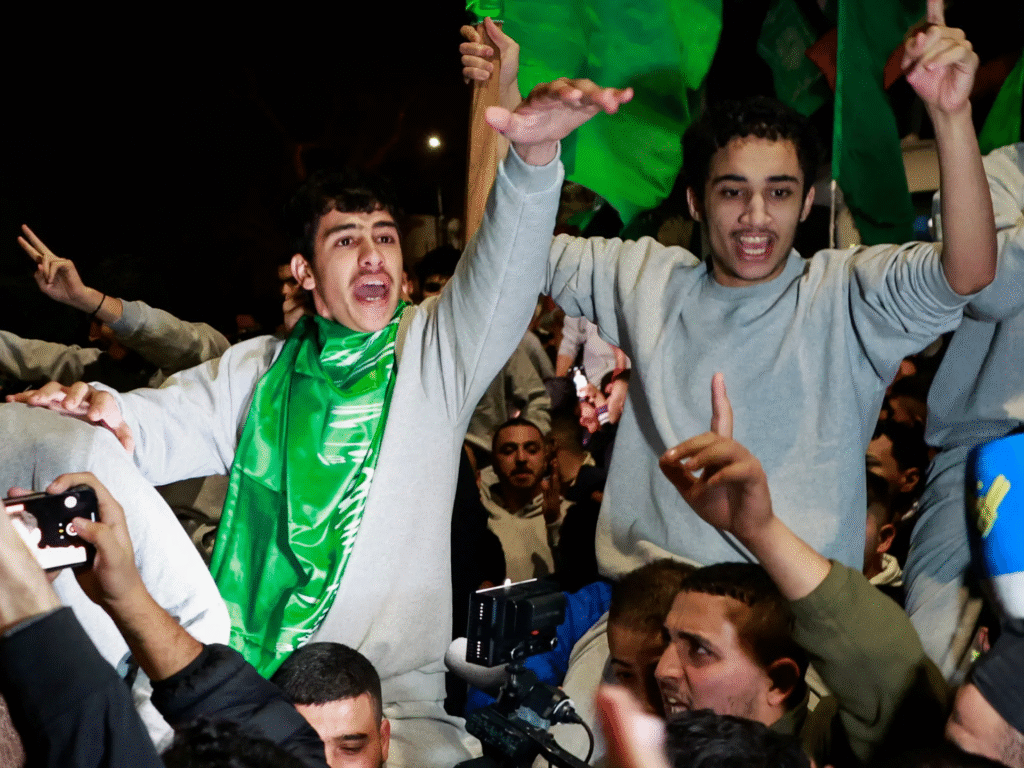
Palestinians celebrating the released prisoners. Photo Credit: Ammar Award of Reuters.
It is important to tell the stories of Palestinian prisoners because it reveals that just like how
Hamas must answer for its mistreatment of Israeli hostages and must allow for the presence of
humanitarian groups to ensure that they are well treated, Israel must significantly alter the manner in
which it arrests and charges Palestinians. The vast difference in how released Palestinian prisoners
are perceived is a testament to the different worldviews held by Israelis and Palestinians. Newspapers
such as the Times of Israel, which from its name one can easily surmise as being pro-Israeli, have
decried how many of the Palestinian prisoners being released were convicted of violent acts. In an
article published on November 28, Carrie Keller-Lynn writes that according to data “compiled by the
Israel Prison Service (IPS) and Israel Defense Forces (IDF), 64 of the 117 Palestinian prisoners
released on Friday, Saturday and Sunday-the first three parts of the hostage release deal-had been
held by Israel for violent crimes.”13 Keller-Lynn states that the women and children being released,
(it should be noted that Keller-Lynn’s exact wording for children is “minors”) have all been indicted
or convicted on grounds of “terror-related offenses.”
These offenses include attempted murder, assault, shootings, stone-throwing, and throwing
an incendiary device. Furthermore, Keller-Lynn states that 20% of the prisoners are members of
Hamas or Palestinian Islamic Jihad. The Times of Israel does acknowledge that a list of 300 potential
Palestinian prisoners up for release did include people that had not been imprisoned without any
charge or trial. “Some of the latter group may be part of the controversial Israeli practice of
administrative detention.”14 Administrative detention is “a form of incarceration without charge or
trial that authorities can renew indefinitely.”15 In other words, administrative detention is really just
a fancy description for violating what many Americans would view as an individual’s basic legal
rights. It should also be noted that all of the 300 prisoners being considered for release are either
under the age of 18 when imprisoned or turned 18 while in prison. “According to the definitions laid
out in the U.N. Convention on the Rights of the Child, these Palestinians were children when they
were arrested by Israel.”16 The Times of Israel also states that of the 86 men released from prison
during the first three days of the truce, were between the ages of 14 to 18, meaning that many children
were released from prison. However, the article never explicitly makes use of the word “children,”
instead preferring terms such as “minors” or “underaged.” Most of these prisoners were released back
into the West Bank or East Jerusalem, which is where they were originally from.17 For those that
wonder why there are children being held in prisons in the West Bank, it is because, according to
Maziar Motamedi of Al-Jazeera, an online publication that has a very different interpretation of the
Israeli-Palestinian conflict than The Times of Israel, that most “Palestinians, including children, are
tried in military courts and handed lengthy sentences in what critics call sham military trials because
in many cases Palestinians are deprived of defense lawyers and due process.
In comparison, Israeli citizens are tried in civil courts, highlighting the two-tier justice system
that discriminates against Palestinians.”18 In fact, Israel is the only “developed” nation in the world
that is guilty of frequently trying children in military courts, a practice that has been frequently
condemned by human rights groups around the world. Not only that, but many of those in its jails,
regardless of age, have been arrested for crimes they have never been convicted of. Of the 300
Palestinian prisoners being considered for release, 233 of them fall into this category.19 To give an
even broader scope to just how severe and serious this gross human rights violation is, of the 7000
Palestinians in prison, 2000 of them are being held in administrative detention without any charges.20
Going back all the way to 1967, Israel has arrested a million Palestinians from Gaza, the West Bank,
and East Jerusalem. Many of whom are believed to be administrative detainees. Not only can
Palestinians be arrested for charges of “terrorism,” but they can also be imprisoned for offenses as
minor as traffic violations. Additionally, the fact that Israeli settlers can be tried in civil courts
whereas Palestinians have to go through military courts, has been condemned by human rights groups
as discriminatory and a form of ‘apartheid.’”21
Since the attacks on October 7, Israel’s use of administrative detention in the West Bank has
only become more appalling as “Israeli authorities have detained roughly as many Palestinians as
have been released in the past few days. A post-Oct. 7 crackdown saw the Palestinian population in
Israeli custody almost double, by some measures: According to Palestinian rights groups, more than
3,000 Palestinians, mostly in the West Bank, were swept up by Israeli security forces.”22 It is
speculated by Ramallah-based political analyst, Nour Odeh, that Israel’s reason for arresting so many
Palestinians is the hope that it will give them more bargaining power with Hamas.23 In other words,
in spite of the media’s preference for using such words as “truce” and “ceasefire” to describe the
exchange between Hamas and Israel over the time frame between November 24 and December 1, it
would seem that those words may not be the most accurate given how Israel made use of collective
punishment to arrest and imprison innocent people despite there being no charges or convictions. In
fact, one could argue that, taking innocent people that have done no wrong, taking them to a place
where they are confined to a small area and given limited access to necessary resources, all in order
to better negotiate with an opposing power that holds captives of its own, is a form of hostage taking
in itself and must warrant international condemnation.
It should be noted though that Hamas was accused by Israel of violating the ceasefire on
November 28, as the IDF claimed that three explosive devices had been detonated near their soldiers
at two distinct locations in the northern Gaza strip. There were also reports of soldiers being fired at
and injured.24 According to HaMoked, an Israeli human rights organization, from October 1st to
November 1st, the Palestinian prisoner population increased by 700, or by nearly a third. Even prior
to the attacks on October 7th, administrative detentions were at a 30-year high and many human right
groups are afraid that they are becoming the norm in Israeli society. Even more damning of the Israeli
judicial system is the fact that these military courts have a conviction rate of 99%, which raises
fundamental questions about how much due process is afforded to Palestinians. Palestinians are
denied legal counsel, face language barriers, have their testimonies mistranslated and are often faced
with charges that are misleading and far-reaching. This is but one of the many reasons for the deep
anger felt by Palestinians regarding Israel’s military rule in the Occupied Territories. B’Tselem,
another Israeli human rights group, have stated that Israel’s ability to imprison people without any
charges for an extended period of time is an extreme power.
According to Heba Morayef, Amnesty International’s regional director for North Africa and
the Middle East, the use of administrative detention is an integral part of the system of apartheid
enforced by Israel on the Palestinian people.25 Some, such as Jeremy Scahill of The Intercept, have
gone so far as to argue that not only is the context of immoral methods in which Israel uses to
imprison Palestinians important, but that one must also take Israel’s military occupation of the West
Bank into account as well. Even when regarding Palestinians who have been tried, convicted, and
imprisoned for violent crimes as to pretend “that the context of this violence is irrelevant is as absurd
as it is unjust, given the appalling conditions Palestinians have lived under for decades. Contrast this
to the widespread impunity that governs the actions of violent Israeli settlers who mercilessly target
Palestinians in an effort to expel them from their homes.”26 Furthermore, it should also be noted that
while many Israelis have claimed that the Palestinians they have arrested were guilty of violent
crimes, the accused Palestinians themselves have disputed these claims. An example of this can be
seen with the recently released 27-year-old Walaa Tanjii, the subject of the documentary “What
Walaa Wants” several years ago, describing her desire to become a member of the Palestinian
Authority’s police. Today, however, she wants nothing more than to continue her mother’s dream of
finishing her education. These dreams were put on hold when she was arrested in 2022 for being
arrested near an Israeli checkpoint in the West Bank. Tanjii denies accusations made by Israel that
she shot at IDF forces at the checkpoint in the West Bank, instead stating that she had been on her
way to congratulate her friend on her recent marriage, when she had been brought to jail and accused
of trying to kill Israeli soldiers.
Tanjii was soon imprisoned in the Ofer Prison, where she says that she was subject to threats
of rape and was threatened with being deprived of food and water. Following the attacks on October
7th, conditions greatly deteriorated, with Tanjii stating that she and her fellow prisoners were subject
to beatings for 49 days.27 Another example of imprisoned Palestinians who deny having committed
any wrongdoing despite Israel’s claims to the contrary is the 17-year old Ahmed Abu Na’im, who
had been imprisoned for a year, meaning he had been sixteen, or a child, when arrested, on, according
to Na’im, account of throwing stones at a protest during clashes with Israeli security forces. In
addition to being charged with stone throwing, Israel also charged him with throwing “‘a bomb or
incendiary device,’” a claim that is denied by Na’im. Na’im states that Israel arrests people randomly
and that he was accused of things he did not commit. Following the October 7 attacks, Na’im stated
that the prisoners, some of whom were as young as 12, were denied requests for medicine. Prisoners
were forced away from windows, deprived of access to plates and spoons, had their blankets and
pillows taken away, and had the rain cover for their window taken away. When asked by CBS News
about this, the Israel Prison Authority (IPS) stated that the children imprisoned were on court orders
and due to such crimes as assault, throwing explosives, and attempted murder. The IPS stated that
they were not aware of Na’im claims and that all prisoners and detainees could file a complaint.
“‘All prisoners are detained according to the provisions of the law,’ the IPS told CBS News.
‘All basic rights required by law are fully applied.’”28 Now that he is free, Na’im has expressed a
desire to live a good life without the presence of the occupation.29 Tanjii and Na’im’s stories are
sadly nothing new. Since the start of the war, rights groups have reported that the Israeli Prison
Service has also considerably restricted water, food, medical care and communal items for prisoners
and has restricted or altogether halted family and lawyer visits.”30 Even more damning, these
accounts of abuse have been happening since before war, to children and adults alike. According to
the rights group, Save the Children, in a report released about three months before the war, stated
“that 86 percent of children are beaten in Israeli detention, 69 percent are strip searched and 42
percent are injured during their arrests.”31 Some children have even reported being subject to sexual
violence.32 Not only are many of the Palestinians prisoners held without any actual charges, not only
are they subject to horrific abuse, but many those that are freed are banned from celebrating with
their loved ones. While there were joyful reunions in the West Bank, in East Jerusalem, celebrations
were suppressed due to the declarations made by Itamar Ben Gvir, the far-right security minister of
Israel, that any form of celebration should be stopped by the Israeli police as the celebrating families
are seen by him as being terrorist supporters that are no better than the Nazis.33 According to Nour
Odeh, many released Palestinians are hailed as heroes by their peers because they are able to
withstand brutal and isolating treatment at the hands of Israelis. Adding to the celebration is the fact
that many of the Palestinian women and children that have been released were not charged or tried.34
Many of Israel’s policies in the West Bank are aided and abetted by the Palestinian Authority (PA),
which has been criticized for its security coordination with Israel, under which it is obliged to share
information regarding armed Palestinian groups. It has a penal code and a judiciary, but the three
million Palestinians in the occupied territories could easily fall under the authority of Israel’s military
courts if they are accused of endangering Israeli security. That could include any activity tied to the
hundreds of Palestinian organizations that Israel has deemed illegal over the decades.”35
The testimonies and accounts of both released Israeli hostages and Palestinian prisoners make
it abundantly clear that there is much change needed in order to ensure a peaceful resolution. The
ideal scenario would be the restoration of a ceasefire to allow for the continued release of both
hostages and prisoners, as well as for the much-needed increase of humanitarian aid as the people of
Gaza are desperately in need of it. However, this is highly unlikely given Israel’s stated desire to
destroy Hamas.36 As such, for the time being, it would be ideal if Hamas allowed for the presence of
international humanitarian groups to observe and ensure the safety of the hostages being held captive.
Likewise, Israel must provide for the basic needs of its prisoners and ensure they are protected from
abuse. However, when, or if, the most recent conflict ends, Israel must take the advice of Michael
Lynk, the UN special rapporteur on human rights in the Occupied Territories, and completely abolish
its practice of administrative detention as it is a violation of the norms of a democratic society, as a
democratic society requires a rule of law.37 Following this, Israel must make an effort to do away
with the entire military court system in the West Bank so as to guarantee that, regardless of ethnicity,
both Israelis and Palestinians are subject to the same legal system. In order for this work, Israel must
end its military occupation of the West Bank in its entirety. With the end of this occupation, perhaps
organizations like the PA might be viewed with less distrust and contempt by the Palestinian people.
Perhaps Israel could even offer to grant full amnesty for the entire Palestinian prisoner population in
exchange for a guarantee from all militant groups that they lay down all their arms. This was one of
the tenets of the Good Friday Agreement that brought about an end to the Troubles between Irish
Catholics and Irish Protestants.38 Furthermore, close allies like the United States need to do
everything they can to ensure that Israel listens to the concerns of human rights groups, as Israel has
stated that organizations like the UN and Amnesty International are engaging in antisemitism with
their accusations of Israeli abuse of Palestinian prisoners.39 Failure by the international community
to work towards these changes will only lead to more violence and suffering for all the people that
inhabit the lands of Israel and Palestine.
- Rachel Clarke, “Little Food, a Beating and Lice: What Freed Israeli Hostages Are Saying about Being Held by Hamas,” CNN, December 1, 2023, https://edition.cnn.com/2023/12/01/middleeast/israeli-hostages-releasedaccounts-hamas-intl-hnk/index.html. ↩︎
- Haley Ott, “Young Palestinian Prisoners Freed by Israel Describe Their Imprisonment and Their Hopes for the Future,” CBS News, November 29, 2023, https://www.cbsnews.com/news/israel-hamas-palestinian-prisonersdescribe-imprisonment-hopes-for-future/. ↩︎
- Lauren Said-Moorhouse et al., “Who Are the Hostages Released during the Israel-Hamas Truce?,” CNN, December 5, 2023, https://www.cnn.com/interactive/2023/12/world/hostage-israel-hamas-deal-dg/. ↩︎
- Scott Neuman, “Israel Releases More Palestinian Prisoners as Part of Extended Exchanges for Hostages,” NPR, November 28, 2023, https://www.npr.org/2023/11/28/1215508077/israel-hamas-gaza-hostages-captives-truceextension. ↩︎
- Said-Moorhouse et al., “Who Are the Hostages Released during the Israel-Hamas Truce?,” ↩︎
- Clarke, “Little Food, a Beating and Lice: What Freed Israeli Hostages Are Saying about Being Held by Hamas,” ↩︎
- Clarke, “Little Food, a Beating and Lice: What Freed Israeli Hostages Are Saying about Being Held by Hamas,” ↩︎
- Clarke, “Little Food, a Beating and Lice: What Freed Israeli Hostages Are Saying about Being Held by Hamas,” ↩︎
- Clarke, “Little Food, a Beating and Lice: What Freed Israeli Hostages Are Saying about Being Held by Hamas,” ↩︎
- Clarke, “Little Food, a Beating and Lice: What Freed Israeli Hostages Are Saying about Being Held by Hamas,” ↩︎
- Haley Ott and Emily Mae Czachor, “Fifth Group of Hostages Released after Israel and Hamas Agree to Extend
Cease-Fire,” CBS News, November 28, 2023, https://www.cbsnews.com/news/israel-hamas-war-cease-firefifth-group-hostages-released-two-day-extension-gaza/. ↩︎ - Wafaa Shurafa, Jack Jeffery, and Lee Keath, “With Deadline Looming, Diplomats Seek to Extend Gaza Truce; More
Hostages, Prisoners Are Freed,” AP News, November 29, 2023, https://apnews.com/article/israel-hamas-warnews-11-28-2023-a909a0a0c9c76ce80d1ff3e94bbe2ec4. ↩︎ - Carrie Keller-Lynn, “Attempted Murder, Shootings, Bombings: Most Freed Palestinians Were Held for Attacks,” The Times of Israel , November 28, 2023, https://www.timesofisrael.com/attempted-murder-shootingsbombings-most-freed-palestinians-were-held-for-attacks/. ↩︎
- Keller-Lynn, “Attempted Murder, Shootings, Bombings: Most Freed Palestinians Were Held for Attacks,” ↩︎
- Ishaan Tharoor, “How Israel Keeps Hundreds of Palestinians in Detention without Charge,” The Washington Post, November 27, 2023, https://www.washingtonpost.com/world/2023/11/27/israel-palestine-detentionadminstrative-prisoners-jail/. ↩︎
- Jeremy Scahill, “Israel’s Insidious Narrative about Palestinian Prisoners,” The Intercept, December 4, 2023,
https://theintercept.com/2023/11/26/palestine-israel-prisoners/. ↩︎ - Keller-Lynn, “Attempted Murder, Shootings, Bombings: Most Freed Palestinians Were Held for Attacks,” ↩︎
- Maziar Motamedi, “Jailed without Charge: How Israel Holds Thousands of Palestinian Prisoners,” Al Jazeera, November 29, 2023, https://www.aljazeera.com/news/2023/11/29/jailed-without-charge-how-israel-holdsthousands-of-palestinian-prisoners. ↩︎
- Scahill, “Israel’s Insidious Narrative about Palestinian Prisoners,” ↩︎
- Nick Schifrin and Zeba Warsi, “Freed Palestinian Prisoner: ‘We Have the Right to Defend Ourselves,’” PBS,
November 27, 2023, https://www.pbs.org/newshour/show/freed-palestinian-prisoner-we-have-the-right-todefend-ourselves. ↩︎ - Motamedi, “Jailed without Charge: How Israel Holds Thousands of Palestinian Prisoners,” ↩︎
- Tharoor, “How Israel Keeps Hundreds of Palestinians in Detention without Charge,” ↩︎
- Schifrin and Warsi, “Freed Palestinian Prisoner: ‘We Have the Right to Defend Ourselves,’” ↩︎
- Neuman, “Israel Releases More Palestinian Prisoners as Part of Extended Exchanges for Hostages,” ↩︎
- Tharoor, “How Israel Keeps Hundreds of Palestinians in Detention without Charge,” ↩︎
- Scahill, “Israel’s Insidious Narrative about Palestinian Prisoners,” ↩︎
- Schifrin and Warsi, “Freed Palestinian Prisoner: ‘We Have the Right to Defend Ourselves,’” ↩︎
- Schifrin and Warsi, “Freed Palestinian Prisoner: ‘We Have the Right to Defend Ourselves,’” ↩︎
- Schifrin and Warsi, “Freed Palestinian Prisoner: ‘We Have the Right to Defend Ourselves,’” ↩︎
- Motamedi, “Jailed without Charge: How Israel Holds Thousands of Palestinian Prisoners,” ↩︎
- Motamedi, “Jailed without Charge: How Israel Holds Thousands of Palestinian Prisoners,” ↩︎
- Motamedi, “Jailed without Charge: How Israel Holds Thousands of Palestinian Prisoners,” ↩︎
- Motamedi, “Jailed without Charge: How Israel Holds Thousands of Palestinian Prisoners,” ↩︎
- Tharoor, “How Israel Keeps Hundreds of Palestinians in Detention without Charge,” ↩︎
- Schifrin and Warsi, “Freed Palestinian Prisoner: ‘We Have the Right to Defend Ourselves,’” ↩︎
- Motamedi, “Jailed without Charge: How Israel Holds Thousands of Palestinian Prisoners,” ↩︎
- Neuman, “Israel Releases More Palestinian Prisoners as Part of Extended Exchanges for Hostages,” ↩︎
- Tharoor, “How Israel Keeps Hundreds of Palestinians in Detention without Charge,” ↩︎
- “Good Friday Agreement: What Is It?,” BBC News, April 3, 2023, https://www.bbc.com/news/uk-northern-ireland61968177. ↩︎
